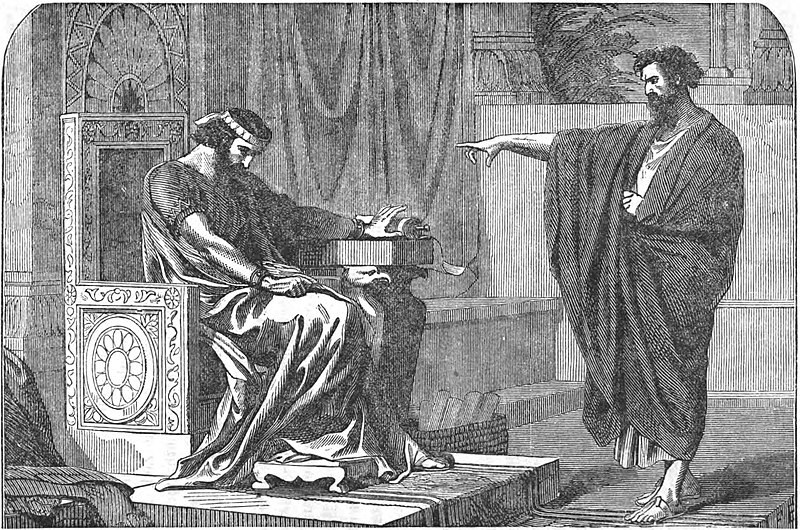Jeremiah was a prominent figure in the Old Testament of the Bible, known as one of the major prophets. He was born in the town of Anathoth, near Jerusalem, and came from a priestly lineage.
Initially hesitant to accept his divine calling as a prophet, he ultimately embarked on a prophetic ministry that spanned over four decades. Jeremiah’s prophetic message primarily revolved around the impending destruction of Jerusalem by the Babylonians due to the disobedience of the people of Judah.
He faced personal suffering and persecution for delivering this unwelcome message and used symbolic acts to convey his prophecies. Additionally, Jeremiah is known for prophesying a “new covenant” that God would establish with His people.
His life and prophecies are recorded in the Book of Jeremiah in the Bible, and his deep emotional reflections on the tragedies he witnessed are expressed in the Book of Lamentations.
Jeremiah’s legacy as the “Weeping Prophet” continues to have a profound impact on religious thought and theology.
Jeremiah Facts
1. Jeremiah was a prophet in the Old Testament:
Jeremiah is recognized as one of the major prophets in the Hebrew Bible (Old Testament) and is considered a significant figure in Judeo-Christian history.
His prophecies and teachings are documented in the Book of Jeremiah, which is part of the prophetic books section of the Bible.
Also Read: Timeline of Jeremiah in the Bible
He is often referred to as the “Weeping Prophet” due to the sorrow he expressed over the fate of Jerusalem and the people of Judah.

2. He was born in Anathoth, near Jerusalem
Jeremiah was born in the town of Anathoth, which was located approximately three miles northeast of Jerusalem. Anathoth was part of the tribal territory of Benjamin and was also a city of refuge in ancient Israel.
Also Read: Isaiah Timeline
Jeremiah’s family background is noteworthy because he came from a priestly lineage, which had an impact on his understanding of religious traditions and his role as a prophet.
3. Initially, he was reluctant to accept his prophetic calling
When God first called Jeremiah to be a prophet, he was hesitant and felt ill-equipped for the task.
In the Bible, in the opening chapters of the Book of Jeremiah, we find a passage where God calls Jeremiah to his prophetic ministry, and Jeremiah responds by saying he is too young and doesn’t know how to speak.
However, God reassures him and tells him not to be afraid, for He will be with him and put His words in his mouth. Despite his initial reluctance, Jeremiah ultimately accepted his divine calling and became one of the most significant prophets in the biblical tradition.
4. His prophetic ministry spanned over four decades
Jeremiah’s prophetic ministry was exceptionally long, lasting for more than forty years.
He began his ministry in the 13th year of the reign of King Josiah of Judah, around 627 BCE, and continued to prophesy through the reigns of several subsequent kings, including Jehoiakim, Jehoiachin, and Zedekiah.
His lengthy ministry allowed him to witness significant political and religious changes in Judah and Jerusalem during a tumultuous period in their history.

5. The Book of Jeremiah in the Bible contains his prophecies
The Book of Jeremiah is one of the longest books in the Bible and contains the recorded prophecies, teachings, and narratives associated with Jeremiah’s ministry.
It is divided into several sections, including oracles against the nations, prophecies of judgment and restoration, and personal reflections and laments by Jeremiah.
The book provides valuable insights into the religious, social, and political issues of his time and serves as a historical and theological record.
6. He warned of the impending destruction of Jerusalem by the Babylonians
One of Jeremiah’s central messages was a warning to the people of Judah and Jerusalem about the impending destruction of their city and the exile of their nation by the Babylonian Empire. He prophesied that this destruction would come as a consequence of the people’s disobedience to God and their idolatry.
His message of impending doom was unpopular, and he faced opposition and persecution from both the political and religious authorities for delivering this unwelcome message.
Ultimately, his prophecies of the Babylonian conquest and exile were fulfilled when Jerusalem fell to the Babylonians in 587 BCE, leading to the exile of many Judeans to Babylon.
7. Jeremiah was imprisoned and faced persecution for his prophecies
Jeremiah’s prophetic message, which included warnings of Jerusalem’s impending destruction, made him deeply unpopular among the ruling class and religious leaders of his time. As a result, he faced persecution and was imprisoned multiple times.
One of the most well-known instances of his imprisonment is recorded in Jeremiah 37-38, where he was thrown into a cistern for his prophecies. However, he was eventually rescued from the cistern by a court official named Ebed-Melech.
These imprisonments and persecutions serve as a testament to the challenges and hardships Jeremiah endured while faithfully delivering his message.

8. He used symbolic acts to convey his messages
Jeremiah often employed symbolic acts as a means of conveying his prophetic messages. These symbolic actions were intended to vividly illustrate the impending judgments and consequences he prophesied.
For example, he wore a wooden yoke on his neck to symbolize the yoke of servitude that the people of Judah would bear under the Babylonian king. These visual and dramatic gestures helped to make his prophecies memorable and impactful.
9. He prophesied a “new covenant” between God and His people
One of the notable aspects of Jeremiah’s prophecies is his prediction of a “new covenant” that God would make with His people.
This prophecy is found in Jeremiah 31:31-34 and is significant in both Jewish and Christian theology. Jeremiah foresaw a time when God would write His law on the hearts of His people, emphasizing an inward transformation of faithfulness rather than just adherence to external laws.
This concept is seen as a precursor to the Christian understanding of the New Testament and the relationship between God and believers through Jesus Christ.
10. Jeremiah’s life was marked by personal suffering and hardship
Throughout his prophetic ministry, Jeremiah experienced significant personal suffering and hardship. He endured rejection, ridicule, imprisonment, and physical threats.
His emotional anguish and sorrow for the plight of his people are evident in the Book of Lamentations, a collection of poetic laments traditionally attributed to him.
These laments express his deep grief over the destruction of Jerusalem and the suffering of the Judean people. Jeremiah’s personal experiences and emotions are an integral part of his prophetic message, underscoring the depth of his commitment to his calling.
